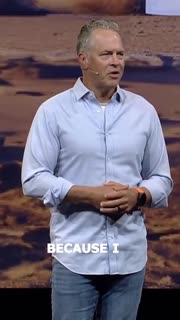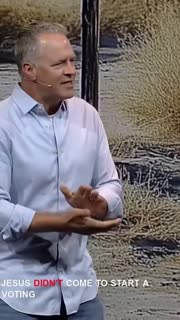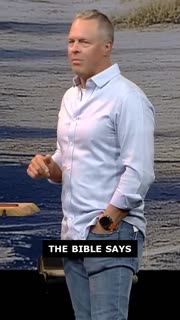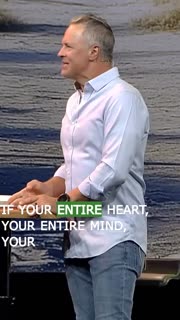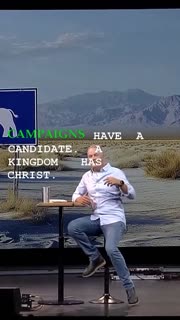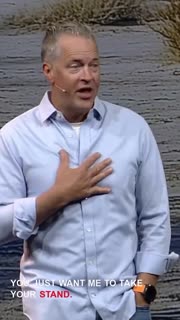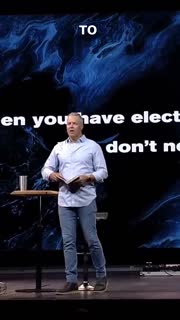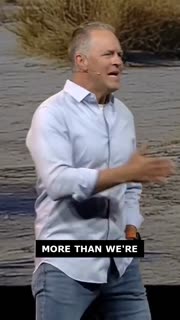Faith Over Politics: Aligning with the Kingdom of God
Devotional
Sermon Summary
Bible Study Guide
Sermon Clips
1. "I'm going to tell you this, because I know that we're thirsty, and I know that the political process, the political system, American culture as it is right now, is just sucking all the spiritual hydration out of us. It's not giving us life, and I want to redirect us to the way of Jesus and try to bring a little bit of help and a little bit of hydration." [00:49] (23 seconds)
2. "Jesus didn't come to start a voting bloc. Jesus didn't come to start a group of people who politicians would pander to to get their votes. It's really odd. We just don't fit in. I don't fit in. The church of the first century was way left of the evangelical church and way right of many other churches in our culture." [05:24] (26 seconds)
3. "You can elect to have Donald Trump as your president for any of those reasons. You can elect to have Kamala Harris as your president, or you can elect to have Jesus as your ruler. You can elect to have Jesus as your ruler. Now, I know this sounds like a cop-out. So, oh, you're just doing like the, no, no, no, no, it's not. Just, just, just, just wait, wait on me here." [08:28] (22 seconds)
4. "The Bible says in the book of Romans that there is therefore now no condemnation for those who are in Christ, which means Jesus will never spank us. We go to God, we never get condemnation. Condemnation already came when Jesus was on the cross. Jesus got condemned. So you and I will never get condemned." [09:41] (15 seconds)
5. "If your entire heart, your entire mind, your entire life is about God, you recognize that he has his imprint on you, therefore he owns you. He owns you and the country in which you dwell, and therefore you can have a peace, a peace that passes all understanding." [17:15] (16 seconds)
6. "Campaigns have a candidate. A kingdom has Christ. A campaign is all about fear. Oh no, don't let those people get in. If they get in, it's gonna be really bad. Oh no. Oh no, oh no, oh no, oh no. And a kingdom is about faith. Trusting that God's going to have his way. Trusting that God's going to make a way." [20:20] (22 seconds)
7. "If you want a heart that's aligned right, if you want a spirit that's lush and vibrant instead of sucked dry, you have to be different. Not just to be different, but because life doesn't work that way. Relationships don't work that way. The kingdom of God doesn't work that way. Jesus didn't work that way." [24:25] (18 seconds)
8. "You just want me to take your stand. It's a huge difference. You've got to take a stand. Everyone says that because they assume I'm going to agree with you. Can't tell you the number of people. We're going to have to vote. A voter. I've lost friends. One friendship I lost because they wanted to have a voter drive." [25:05] (14 seconds)
9. "If you decide to give your whole life to Christ and vote to make him your own, your ruler, get used to losing on election day because your values are going to be different than the average Americans and you're just not going to vote for a lot of people who win. So, sorry. Sorry. Join the club of losers." [29:51] (14 seconds)
10. "We're being discipled by our media more than we're being discipled by Jesus. We're more interested in fitting into whatever cultural narrative we align with than fitting in with the kingdom of God narrative. Where do we get our information? What's our heart? What's our desire?" [34:08] (18 seconds)
Ask a question about this sermon
2. "Jesus didn't come to start a voting bloc. Jesus didn't come to start a group of people who politicians would pander to to get their votes. It's really odd. We just don't fit in. I don't fit in. The church of the first century was way left of the evangelical church and way right of many other churches in our culture." [05:24] (26 seconds)
3. "You can elect to have Donald Trump as your president for any of those reasons. You can elect to have Kamala Harris as your president, or you can elect to have Jesus as your ruler. You can elect to have Jesus as your ruler. Now, I know this sounds like a cop-out. So, oh, you're just doing like the, no, no, no, no, it's not. Just, just, just, just wait, wait on me here." [08:28] (22 seconds)
4. "The Bible says in the book of Romans that there is therefore now no condemnation for those who are in Christ, which means Jesus will never spank us. We go to God, we never get condemnation. Condemnation already came when Jesus was on the cross. Jesus got condemned. So you and I will never get condemned." [09:41] (15 seconds)
5. "If your entire heart, your entire mind, your entire life is about God, you recognize that he has his imprint on you, therefore he owns you. He owns you and the country in which you dwell, and therefore you can have a peace, a peace that passes all understanding." [17:15] (16 seconds)
6. "Campaigns have a candidate. A kingdom has Christ. A campaign is all about fear. Oh no, don't let those people get in. If they get in, it's gonna be really bad. Oh no. Oh no, oh no, oh no, oh no. And a kingdom is about faith. Trusting that God's going to have his way. Trusting that God's going to make a way." [20:20] (22 seconds)
7. "If you want a heart that's aligned right, if you want a spirit that's lush and vibrant instead of sucked dry, you have to be different. Not just to be different, but because life doesn't work that way. Relationships don't work that way. The kingdom of God doesn't work that way. Jesus didn't work that way." [24:25] (18 seconds)
8. "You just want me to take your stand. It's a huge difference. You've got to take a stand. Everyone says that because they assume I'm going to agree with you. Can't tell you the number of people. We're going to have to vote. A voter. I've lost friends. One friendship I lost because they wanted to have a voter drive." [25:05] (14 seconds)
9. "If you decide to give your whole life to Christ and vote to make him your own, your ruler, get used to losing on election day because your values are going to be different than the average Americans and you're just not going to vote for a lot of people who win. So, sorry. Sorry. Join the club of losers." [29:51] (14 seconds)
10. "We're being discipled by our media more than we're being discipled by Jesus. We're more interested in fitting into whatever cultural narrative we align with than fitting in with the kingdom of God narrative. Where do we get our information? What's our heart? What's our desire?" [34:08] (18 seconds)
